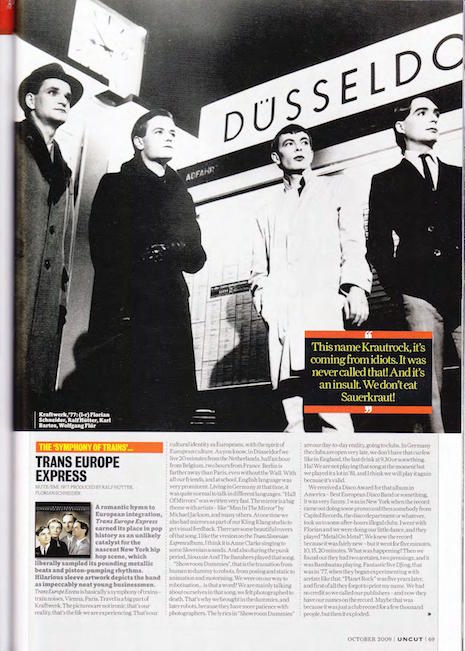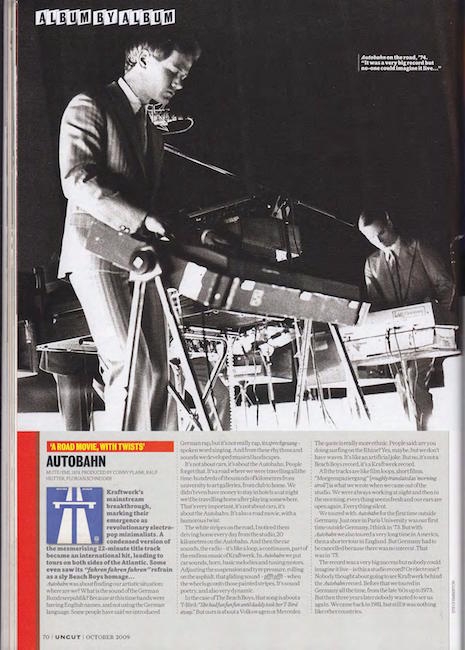
In 2009 Uncut magazine managed to get Ralf Hütter of Kraftwerk to go through the entire Kraftwerk discography and comment on the band’s albums one by one. Because of his role in creating these albums it’s a bit silly to call his comments “reviews” but you know, it’s close enough.
When this piece was executed, the split between Hütter and Florian Schneider was quite fresh—Florian had played his last gig with Kraftwerk three years earlier, on November 11, 2006, at Feria de Muestras in Zaragoza, Spain, and the news of Florian’s exit from the band was only a few months old. Uncut addressed the situation in the introduction:
The acrimonious departure last year of Hütter’s fellow Kraftwerk founder, Florian Schneider, is still a sensitive subject. “We haven’t seen him for a long time,” Hütter shrugs. “I cannot speak for my former partner, friend and co-composer, but he always hated touring and concerts.”
Perhaps it was to assuage any doubts people might have about a touring four-piece Kraftwerk with just one member from the classic 1970s/‘80s lineup in it that Hütter chose to discourse so expansively on the legendary band’s illustrious catalog. Uncut skipped a couple of releases, notably Kraftwerk 2, Electric Café, and The Mix, but covered the entirety of what they surely saw as the meat of Kraftwerk’s golden period in the late 1970s.
For every album, ranging from 1970’s debut Kraftwerk up to 2003’s Tour De France Soundtracks, I’ve excerpted a paragraph or so from Hütter’s full comments. For the full scoop, by all means check out Uncut’s page or the large-format images of the pages we’ve provided below.
KRAFTWERK, 1970
We were finding Kraftwerk, setting up the Kling Klang studio, finding musicians to work with, discovering composition, discovering the German language, human voice, synthetic voice. Me and Florian had our Kling Klang studio since 1970, and before that we had a free-form music group. We used to play at universities or parties or art galleries. And one day we said: OK, there must be a mothership, a laboratory, a studio HQ where we put things together.RALF & FLORIAN, 1973
We listened to quite a lot of electronic stuff at that time. On the art scene, and on the radio. We were brought up within the kind of classical Beethoven school of music, but we were aware there was a contemporary music scene, and of course a pop and rock scene. But where was our music? Finding our voice, I think that was the use of the tape recorder. So that’s what happened, we tried to forget all the things we knew before. I think our contact to the tape recorder made us use synthetic voices, artificial personalities, all those robotic ideas.AUTOBAHN, 1974
It’s not about cars, it’s about the Autobahn. People forget that. It’s a road where we were travelling all the time: hundreds of thousands of kilometres from university to art galleries, from club to home. We didn’t even have money to stay in hotels so at night we’d be travelling home after playing somewhere. That’s very important, it’s not about cars, it’s about the Autobahn. It’s also a road movie, with a humorous twist.RADIO-ACTIVITY, 1975
It’s a science fiction kind of album. Horror and beauty. The concept was infiltration by radio station – which is maybe more dangerous than radioactivity. We worked with tapes, editing pieces, glue. All electronics. And more singing and speaking, like speech symphonies.It was written in two languages, English and German. Autobahn was just one. It was not a statement, just these lyrics came to our mind—“Radioactivity, is in the air for you and me…” Just ideas coming together, and then anticipating the next album, which was all in two languages, like in films. There were always talks about Kraftwerk working with films, but they didn’t happen – apart from [German director Rainer Werner] Fassbinder, but he used finished pieces of our music in different interpretations in his films. Radio-Activity was a favourite of Fassbinder, he used it in Russian Roulette and in Berlin Alexanderplatz.
TRANS-EUROPE EXPRESS, 1977
Trans-Europe Excess [a typo or a sly joke by Ralf??] is basically a symphony of trains—train noises, Vienna, Paris. Travel is a big part of Kraftwerk. The pictures are not ironic, that’s our reality, that’s the life we are experiencing. That’s our cultural identity as Europeans, with the spirit of European culture. As you know, in Düsseldorf we live 20 minutes from the Netherlands, half an hour from Belgium, two hours from France. Berlin is farther away than Paris, even without the Wall. With all our friends, and at school, English language was very prominent. Living in Germany at that time, it was quite normal to talk in different languages. “Hall Of Mirrors” was written very fast. The mirror is a big theme with artists – like “Man In The Mirror” by Michael Jackson, and many others. At one time we also had mirrors as part of our Kling Klang studio to get visual feedback. There are some beautiful covers of that song. I like the version on the Trans Slovenian Express album, I think it is Anne Clarke singing to some Slovenian sounds. And also during the punk period, Siouxsie And The Banshees played that song.THE MAN-MACHINE, 1978
The words are more like musical keys or clues, like in Autobahn or The Man-Machine, the sound says it all. Because we work so much with machines, the best music is playing itself – maybe through me, or through my friends and colleagues, but it’s coming from itself. That’s what we try to do. It’s not always possible, but we try our best. The ultimate speech composition is ‘Boing Boom Tschak’ [from ’86’s Electric Café] because the music speaks itself. It’s also endless because once you have that concept you can go on for five minutes, five hours or five days.COMPUTER WORLD, 1981
We didn’t even have computers. Even though the music was created by synthesisers and sequencers, it was analogue, pre-computer. We got our first home computers after the album was finished, the first Ataris. But no, it wasn’t a warning, it was reality. We were there, even though the album wasn’t made on computers, it was our reality. Society was being computerised, a lot of people didn’t notice at that time but we did. Computers were being used by states, the KGB, Interpol, Deutsche Bank.TOUR DE FRANCE SOUNDTRACKS, 2003
Sometimes we forget about things and they come back to us, they get a new meaning and a new dynamic, and then we find the concentration to finish a piece of work. Tour De France was all written before as scripts, notes, keywords, lyrics and concepts. In ’83, with the Tour, in a rush we released the single. Then it suddenly disappeared as we worked on digital technology, samplers, digitising our studio.
Here are the original pages from the October 2009 issue of Uncut (click for a larger view):




Previously on Dangerous Minds:
Kraftwerk sings ‘Pocket Calculator’ in Italian… and several other languages
He was a robot: DM catches up with ex-Kraftwerk member Wolfgang Flür